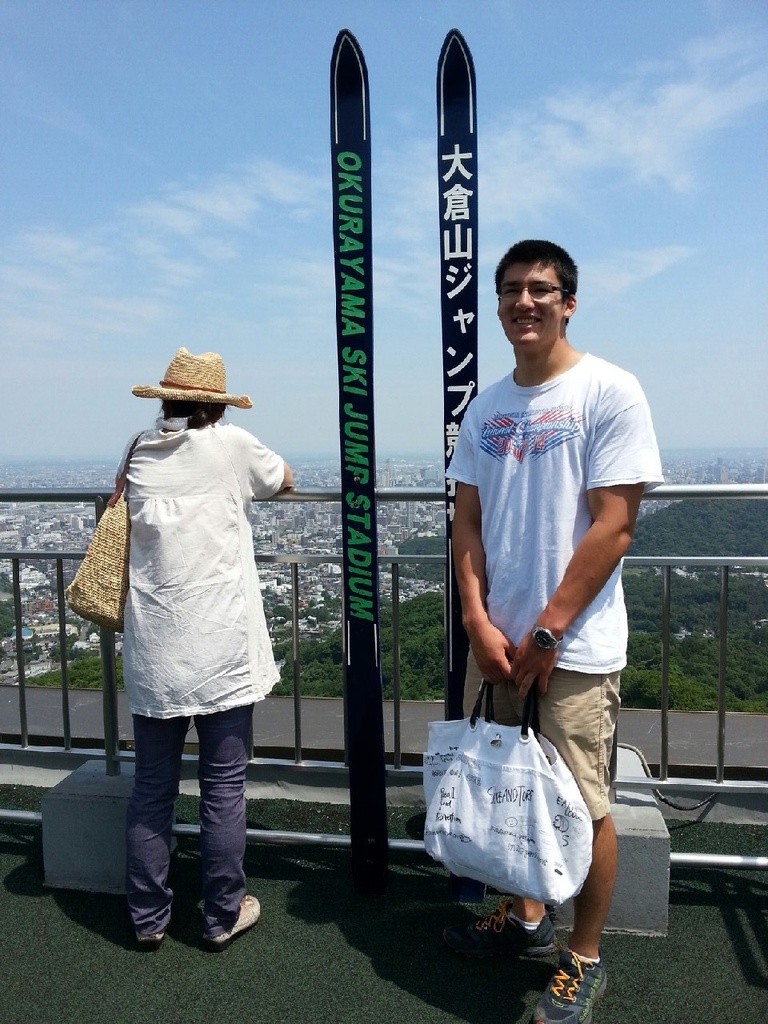An Open Letter to Half-Japanese Traveling to Japan
Grant Bogdanove is a University of Iowa senior studying economics and Japanese with a minor in psychology. This summer, he was a 2015 recipient of the Diversity Ambassador Scholarship for Study Abroad, which he applied toward the Hokkaido International Foundation homestay in Hakodate, Japan. Read on to learn how Grant’s biracial identity helped him attain more knowledge about Japanese culture and overall shaped his experiences abroad.

By Grant Bogdanove
In an increasingly global society, biracial marriages are, for the most part, accepted. Because of the diversity within the United States, most Americans are accustomed to not only seeing, but interacting with biracial individuals. In my case, I traveled to a country where there are strict laws that hinder immigration and an overarching notion that the gene pool is pure and must not be diluted.
This country is of course, Japan. Japan is a nearly-homogeneous society with a powerfully peculiar notion that they are different and isolated from all other people on the planet. I was born in 1994 to a Japanese mother and American father. Though not unheard of, this type of relationship was most certainly rare — especially twenty years ago.
My mother is fluent in English and my parents did not see a need for me or my siblings to learn Japanese, so I grew up only speaking English. Half of my relatives live in Japan so I decided to pick up the language in college in an oh-so cliche move to “rediscover my roots”. All jokes aside, I was able to travel to Hakodate, Hokkaido Japan in the Summer of 2015 as part of the Hokkaido International Foundation’s Summer Language Program.
Forewarning: I will write of my personal experiences and make generalizations so there are a few things to keep in mind. Firstly, I was in a city that is famous for tourism and has a long history of international relations. The people there are fairly accustomed to foreigners and are open to them (by Japanese standards). Second, I was in a school with other foreigners so my interactions with Japanese people around my own age were limited. This is just one person’s experiences and opinions so take them with a grain of salt.
First of all, the big question for me was “Are people going to know what I am.” The answer is plain and simple... No. Some people thought I was White, others thought I was Asian, a few guessed half and I even had one girl posit that I was Hispanic. So no, people will not know what you are until you tell them. When I told people that I was half Japanese they seemed more open and friendly to me. Perhaps they felt that because I was somewhat Japanese, they could empathize with me more. Another thing that happened many times after revealing that I was half was that they would call me “Ikemen”. “Ikemen” means handsome. If you are a girl they will call you “Kawaii”, or cute. If you’re interested in finding a boyfriend or girlfriend you will be successful. There are many Japanese celebrities that are half. Because of this, there is a stereotype that all halfs are good-looking, even if you are not particularly good-looking, like me. This is somewhat of a paradox because the half-Japanese that are not famous can sometimes face discrimination.
As mentioned above, there is a large population of Japanese that believe that the gene pool must remain pure. Because of this, you may receive disapproving looks or a little less than superior service at a restaurant if you go around spouting your ethnic background. I got this information from my host mother, and thankfully did not experience any discrimination personally during my stay. The perks that come with being half are nice, but I would not widely project that you are half wherever you go. The Japanese people are extremely polite, however, and the chances of facing any serious discrimination are next to nil. Another thing is, as a half-Japanese you are expected to speak Japanese better and understand the culture better than your non-Japanese counterparts. It is considered embarrassing if you are part-Japanese, but cannot speak the language, so brush up!
The big thing I felt while I was there was that though I was able to interact with many Japanese people more naturally than my classmates, my classmates were given more slack when it came to making cultural or lingual faux pas. Enjoy the perks of being half-Japanese in Japan and if you face any setbacks, overcome them with tact. My biggest piece of advice: just be yourself. Don’t worry about trying to be American or trying to be Japanese. Embrace the culture and intertwine it with your own identity and you will have a great time.
Learn more about the Diversity Ambassador Scholarship for study abroad, or read more reflections from our Diversity Ambassadors.